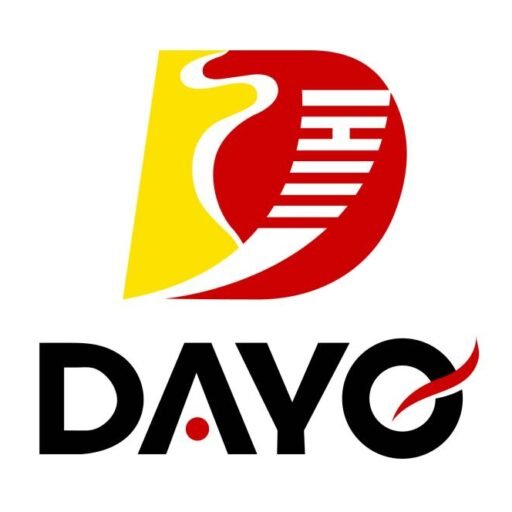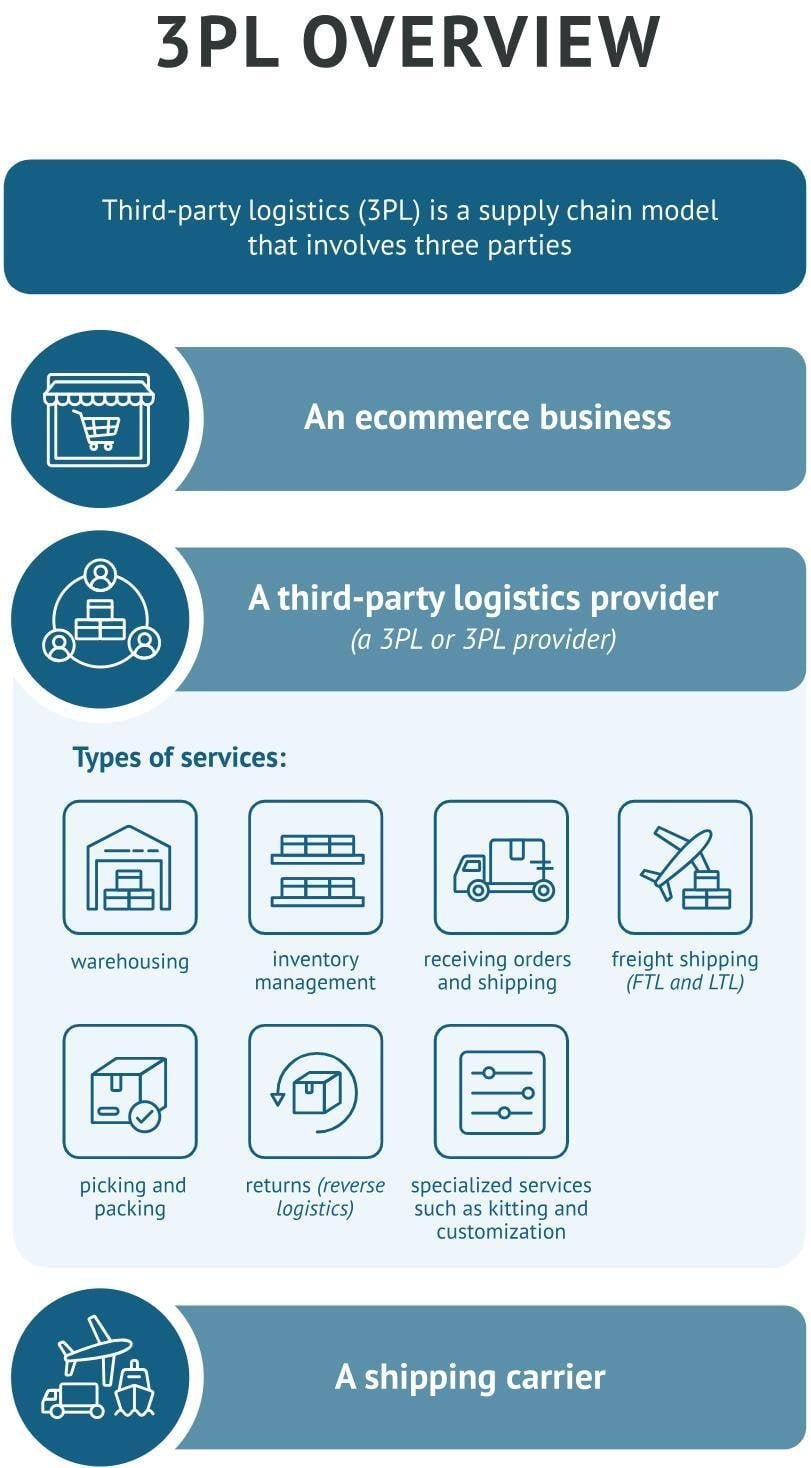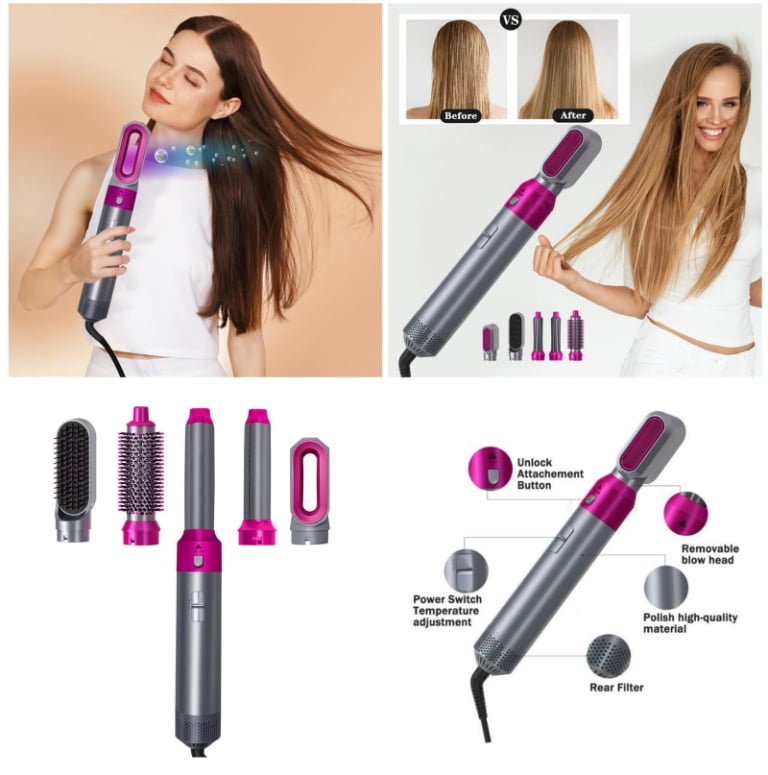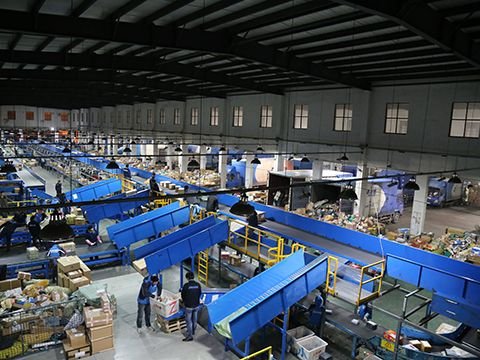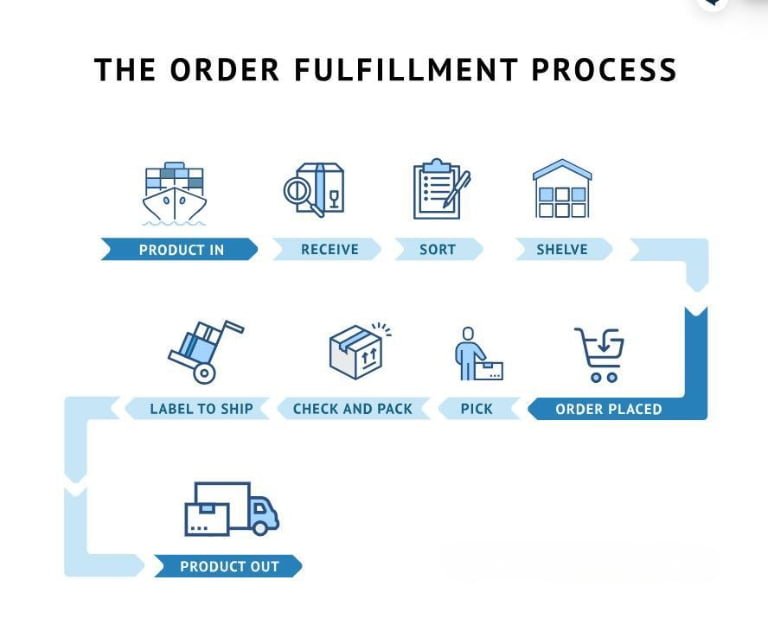A Third-Party Logistics provider (3PL) is an external partner that manages logistics operations for businesses. 3PLs are frequently utilized by e-commerce companies that retain control over product and order-related activities but wish to outsource inventory management, warehousing, and fulfillment processes, including shipping, distribution, returns, and exchanges. By collaborating with a 3PL provider, merchants can concentrate on other critical aspects of their business.
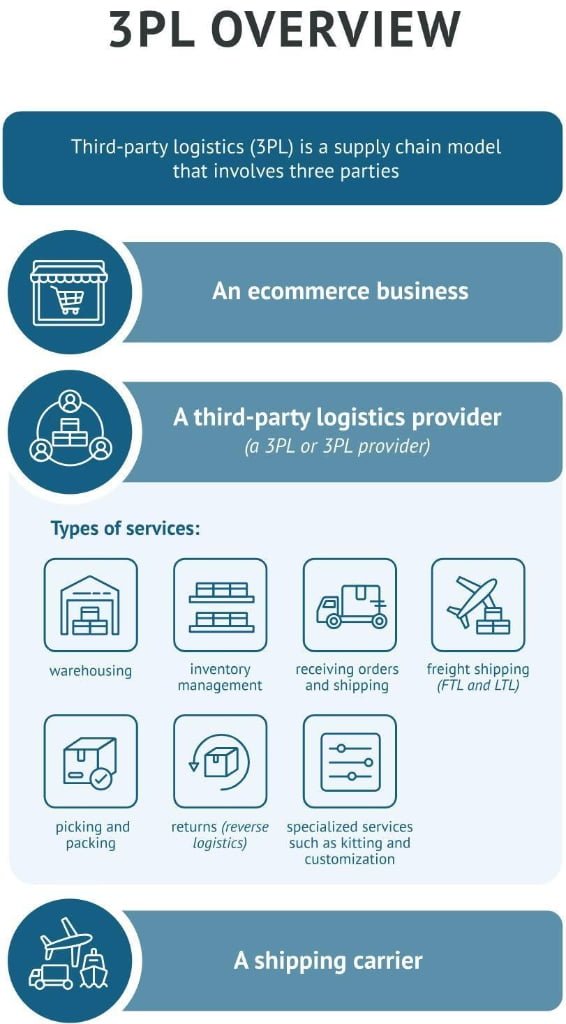
Understanding what a 3PL is and how it operates is essential before partnering with a third-party logistics provider. This guide explains the workings of the 3PL process, outlines the various types of 3PL services available, and offers guidance on selecting the right 3PL provider for your business needs.
How 3PL Works
3PL providers offer a range of logistics services tailored to different business needs. Order fulfillment companies, as 3PL providers, typically handle warehousing, inventory management, order processing, packaging, and shipping. Other 3PL companies may focus on specific areas such as freight, import/export, or distribution services.
Did you know?
The term 3PL is frequently used interchangeably with order fulfillment, fulfillment center, or fulfillment warehouse. However, order fulfillment companies are a specific type of 3PL that e-commerce businesses employ to outsource their fulfillment processes. While a fulfillment center is a type of 3PL, not all 3PLs function as fulfillment centers.
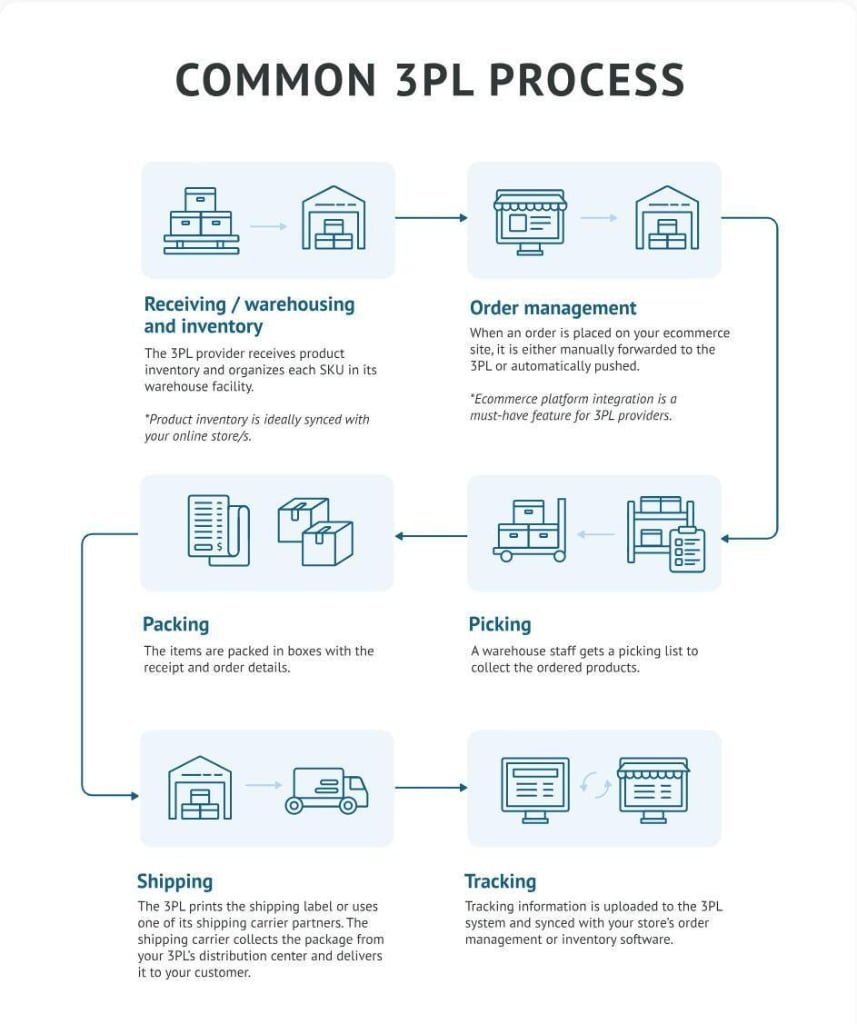
Most businesses that utilize 3PL fulfillment companies continue to manage their own product sourcing, manufacturing, and procurement. The role of third-party logistics begins once your products are shipped to a 3PL warehouse.
Receiving/Warehousing and Inventory: The 3PL provider receives your product inventory and organizes each SKU within their warehouse facility. Ideally, the product inventory is synced with your online store(s).
Order Management: When an order is placed on your e-commerce site, it is either manually forwarded to the 3PL or automatically integrated with the 3PL through your e-commerce platform.
Picking: Warehouse staff receives a picking list to gather the ordered products.
Packing: The items are then packed into boxes along with the receipt and order details.
Shipping: The 3PL prints shipping labels using one of its carrier partners. The shipping carrier collects the package from the 3PL’s distribution center and delivers it to your customer.
Tracking: Tracking information is uploaded to the 3PL system and synced with your store’s order management or inventory software.
Advantages and Disadvantages of Using 3PL
| PROS | CONS |
|---|---|
| Fulfillment and logistics expertise | Upfront investment |
| Discounted shipping rates and reduced overhead costs | Different operations and operating hours |
| Takes care of resource-intensive tasks | Loss of control over service quality |
| Distributed inventory for faster shipping | Inefficiencies reflect on your business |
| Scalable warehousing | Difficult to customize orders and fulfill special requests |
3PL has its benefits as well as risks and disadvantages. As a business owner, it is up to you to weigh if the risks outweigh the benefits your business will get.
3PL PROS.:
Some benefits your business can get from using a third-party logistics provider include:
- Your orders are processed by experts specializing in order fulfillment. Also, you have access to value-added services that enhance your ecommerce business, such as kitting, packaging customization, and freight brokering. 3PL companies can help you choose the best packaging, shipping, and inventory management options for your business.
- You don’t have to lease warehouse space or hire staff. Through a 3PL you can easily increase or decrease your on-hand resources (like storage space and labor). This lets you save money and easily scale up or down as business flucates.
- Your business operations may be in a prime spot to ship nationwide. Many 3PLs have multiple fulfillment centers strategically positioned throughout the country so your products are closer to your customers—which means faster delivery and lower shipping costs. Additionally, 3PL companies are volume shippers and usually have discounted shipping prices with major carriers, helping reduce your shipping spend.
- 3PL companies can handle returns (reverse logistics). This gives you an efficient way to give your customers more flexibility and get your products back on the shelf quickly.
3PL CONS.:
There are disadvantages to 3PL as well. Some of these are the following:
- There is an upfront investment. While 3PLs can reduce your overhead costs, there can sometimes be significant upfront costs when onboarding with a 3PL provider. Some companies charge for services such as integrating their software with your ecommerce store, SKU upload, and account access. Additionally, many 3PLs have a minimum monthly spend or order volume that you must meet (or pay an extra charge). Learn more about order fulfillment costs and pricing.
- 3PL providers maintain their own operations, which may have different working hours or workflows from your company. You cannot overrule or intervene in their operations immediately, as service contracts are in place. This also makes it difficult (or impossible) to customize orders and fulfill special customer requests on the fly.
- The 3PL’s services reflect on your brand. Any inefficiencies or errors that your customers experience (like incomplete orders, late shipments, mismatched addresses, or breakage during shipping) will represent your business, not theirs. By outsourcing your logistics processes, you lose control over service quality.
Is 3PL Right for Your Business?
To determine if it’s time to use third-party logistics for your e-commerce business, look for these key indicators:
You Ship Over 100 Orders a Month
If you find yourself in this situation, compare the costs of partnering with a 3PL to ensure you can maintain or even improve your profit margins. Outsourcing tasks like packing, picking, and shipping can save you significant time and money. Additionally, your growth potential increases when you outsource fulfillment to a 3PL.
You’re Running Out of Inventory Space
As your sales grow, you’ll need more inventory on hand, which can become challenging if you’re fulfilling orders in-house. A 3PL warehouse can provide additional inventory space and help you efficiently manage inventory. This eliminates the worry about storage limitations, especially if you plan to expand your product line.
Your Existing System Can’t Handle a Surge in Demand
If you experience flash sales or seasonal spikes in demand, can your current system handle the increased order volume? If these spikes require hiring temporary staff or renting extra workspace, outsourcing to a 3PL may be a more cost-effective solution.
You Want to Offer Free Two-day Shipping
Modern online shoppers expect fast shipping, and a significant percentage prefer stores that offer free shipping. Providing these services can strain your profit margins. Partnering with a 3PL provider grants you access to lower shipping costs and faster delivery times, thanks to their volume shipping discounts and strategically located fulfillment centers.
How to Choose a 3PL Provider
If you’re ready to partner with a 3PL or are evaluating multiple providers, consider the following factors to select the right vendor:
Know Their Area of Expertise
Identifying the specific needs your 3PL provider must meet is crucial. For instance, if you sell bulky or heavy items, you might need a provider like Red Stag Fulfillment, which specializes in oversized shipping. For lightweight items with extensive integration needs, ShipBob could be a better fit.
Evaluate the Scale of Their Operations
Leverage the existing logistics operations of a 3PL provider by assessing their efficiency. Consider:
- The number and location of their warehouses.
- Their monthly shipment volume in B2C, B2B, domestic, and international categories.
- Operational hours and additional services like custom packing slips or gift messages.
- Their capacity for handling returns (reverse logistics) and handling order volume spikes.
- The feasibility of next-day fulfillment and their cutoff times.
Ask About Fulfillment Costs
Understand the costs associated with partnering with a 3PL, including warehousing, storage, and shipping fees. Obtain quotes to calculate potential savings and compare them to your current in-house fulfillment costs. Request quotes from multiple providers to secure the best deal.
Ask About Contracts & Service Level Agreements (SLA)
Before signing a contract, inquire about SLAs and key details such as inventory turnaround time, order processing time, error and reimbursement policies, insurance availability, and the termination process.
Determine the Level of Support They Provide
Evaluate the support offered by the 3PL provider by asking about their communication channels, response times, and whether their support team is domestic or outsourced. Check if you’ll have a dedicated customer agent and inquire about their reporting tools and communication policies.
Check for Available Integrations
This can be a deciding factor. Ensure that the 3PL provider can integrate with your existing e-commerce platforms, as well as inventory, order management, and warehouse management systems. They should be able to synchronize with your current systems to automate order fulfillment and inventory updates.
What Is 3PL Frequently Asked Questions (FAQs)
What is a 3PL?
A third-party Logistics (3PL) company is an outsourced provider that businesses hire to manage their logistics operations. These companies handle tasks such as inventory management, warehousing, order fulfillment, and shipping on behalf of their clients.
What is an Example of a 3PL?
Examples of 3PLs include:
- Fulfillment Centers: Companies like Fulfillment by Amazon (FBA) and ShipBob handle storage, order processing, and shipping.
- Freight Brokers: Companies like Redhawk Logistics arrange transportation and negotiate freight rates.
- Shipping Carriers: Companies like UPS and FedEx provide shipping and delivery services.
- Freight Forwarders: Companies like Flexport manage the logistics of shipping goods internationally.
3PL services typically encompass warehousing, inventory management, order processing, product distribution, and handling returns and exchanges.
Why Use a 3PL?
E-commerce businesses often turn to 3PL providers when they can no longer handle their order volumes, lack sufficient storage space for inventory, or aim to offer faster shipping to their customers. Partnering with a 3PL can help scaling or growing businesses automate their logistics processes, allowing them to focus on other critical aspects of their operations.
1PL vs 2PL vs 3PL vs 4PL
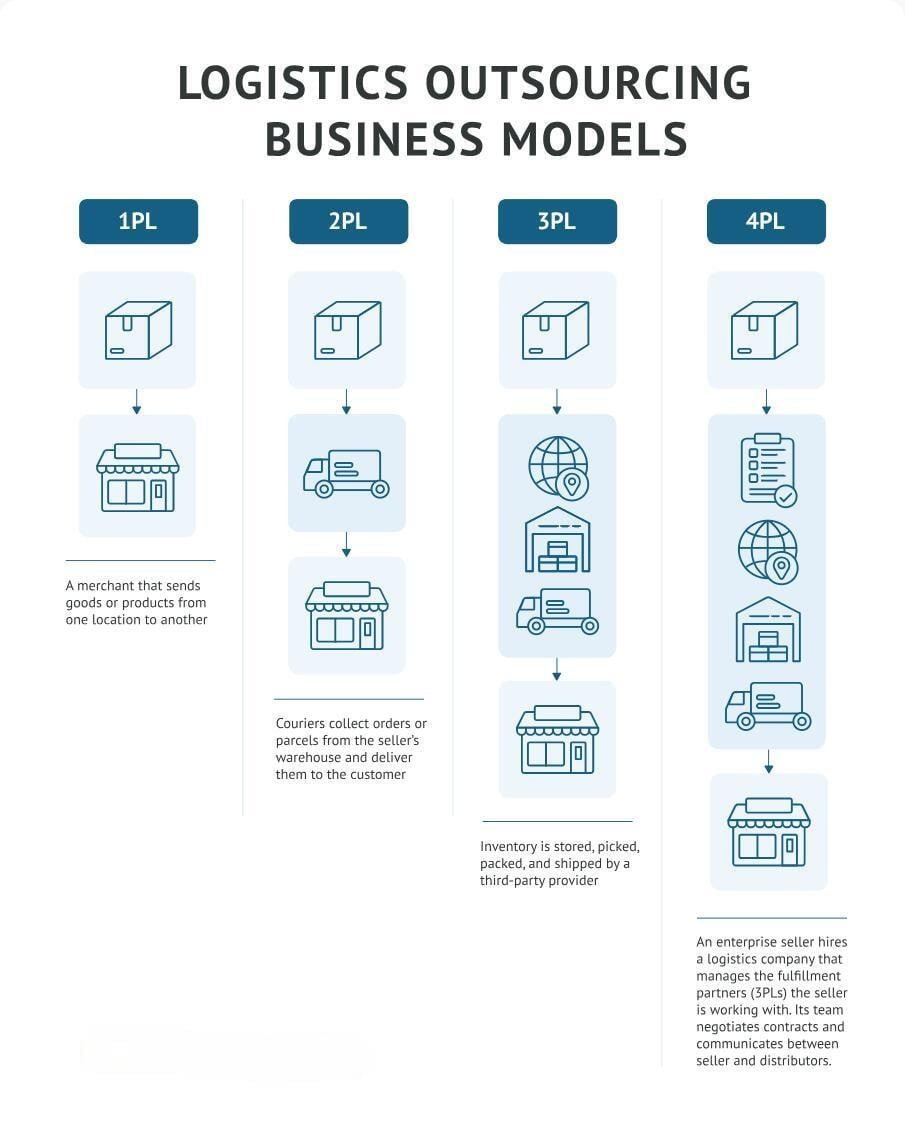
Outsourcing Logistics: Understanding 1PL, 2PL, 3PL, and 4PL
Outsourcing logistics can be done through various business models. Here’s a brief explanation of the differences between 1PL, 2PL, 3PL, and 4PL:
1PL (First-Party Logistics):
A 1PL refers to a business that handles its own logistics and transportation. For example, a local coffee roaster that directly delivers coffee beans to cafes or coffee shops is considered a 1PL.
2PL (Second-Party Logistics):
A 2PL involves using a courier or transportation service to move goods from one location to another. In this case, the same coffee roaster might hire a 2PL provider, such as UPS or FedEx, to transport coffee beans from their facility to the cafes.
3PL (Third-Party Logistics):
A 3PL provider manages various logistics services such as warehousing, order fulfillment, and shipping. For instance, a 3PL could store the roasted coffee beans, process orders from local cafes, pack the beans into boxes, and ship the orders from the warehouse to the cafes.
4PL (Fourth-Party Logistics):
A 4PL provider oversees all aspects of a company’s logistics operations, including managing relationships with 3PL providers. A 4PL handles contract negotiations, communication between the business and distributors, and the overall supply chain logistics. In the coffee roaster example, a 4PL might manage the import of raw coffee beans, oversee the fulfillment company, and coordinate with the roaster to ensure production meets the demand of the cafes.
Types of 3PL Providers
3PL companies offer a range of logistics services, including distribution, storage, transport, and fulfillment. They are typically integrated into a company’s warehousing and transportation operations, supporting various aspects of fulfillment and shipping. Here are the different types of 3PL providers you can partner with:
Distribution-Based 3PL Providers: These companies store your products until orders are placed. Once an order is received, they pick the items from their inventory, package them, and ship them to the recipient.
Financial-Based 3PL Providers: Specializing in the financial aspects of e-commerce logistics, these companies handle tasks such as freight payment, audits, and the accounting and financial management of inventory.
Forwarder-Based 3PL Providers: These providers primarily focus on moving your stock from your warehouse to a mail carrier that handles the final delivery.
Information-Based 3PL Providers: Operating primarily online and focused on B2B operations, these companies use electronic marketplaces to facilitate their logistics and transportation services.
Transportation-Based 3PL Providers: These teams specialize in managing transportation from factories to warehouses and ultimately to customers.
3PL Services
Here are some examples of services that third-party logistics (3PL) providers can offer:
Warehouse and Inventory Management: 3PL providers offer storage solutions (warehousing) for your inventory and provide inventory management systems to help you keep track of stock. With multiple warehouses, they can store your products closer to your customers, ensuring faster shipping times. They can also relocate inventory based on the geographic distribution of your orders.
Order Management and Fulfillment: 3PLs utilize order management systems that monitor stock levels across various warehouses and integrate with your e-commerce platform. This allows you to oversee and manage shipping. They handle tasks such as sending order confirmations, shipping notifications, and delivery updates to customers.
Value-Added Specialized Fulfillment Services: 3PLs offer custom fulfillment services, including kitting, bundling, personalized notes, gift wrapping, and more, to enhance the customer experience.
Shipping and Transport Coordination: 3PL providers coordinate with established shipping companies or maintain their own shipping fleets. They also offer services like freight brokering and freight forwarding, ensuring efficient transportation of goods.
Reverse Logistics (Returns): Full-service 3PLs manage returns and exchanges, providing customer service support throughout the process.
International Logistics: Some 3PL providers have locations in multiple countries, enabling local fulfillment in foreign markets and reducing shipping and customs costs. Many domestic fulfillment providers offer cross-border shipping options, such as delivery duty paid (DDP) services. Additionally, 3PLs can handle customs clearance and international freight forwarding for import/export needs.
Bottom Line
Small businesses can gain significant advantages from outsourcing to 3PL providers, as it reduces the need for investment in their own logistics infrastructure and staffing. By understanding how 3PL solutions operate, you can determine which services would be most beneficial to outsource and identify the best partners to meet your business needs.
